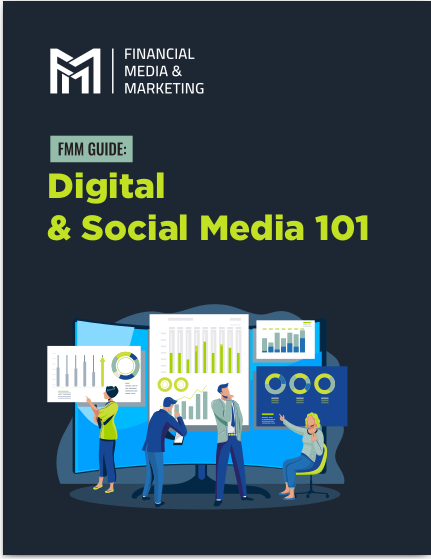Key Takeaways
-
Content marketing is one of the most effective ways for financial advisors to build trust, attract ideal clients, and stand out in a competitive market.
-
Strategic content not only showcases your expertise but also establishes your brand as the go-to resource for clients seeking financial guidance.
Why Financial Advisors Need Content Marketing Today
As a financial advisor, your ability to differentiate yourself in a crowded market is crucial. Clients today are not just looking for someone to manage their money—they want someone who aligns with their values, understands their goals, and can guide them through financial complexities. This is where content marketing shines.
Content marketing isn’t just a buzzword; it’s a powerful way to educate, engage, and connect with your audience. By creating and sharing high-quality, targeted content, you position yourself as an expert, attract your ideal clients, and nurture trust—all while strengthening your brand identity.
What is Content Marketing, and Why Does It Work?
At its core, content marketing is the creation and distribution of valuable, relevant content designed to attract, engage, and retain a specific audience. For financial advisors, this could mean blogs, newsletters, videos, or even social media posts that address your clients’ pain points and offer practical solutions.
Unlike traditional advertising, which interrupts your audience with sales messages, content marketing invites them to engage with your brand on their terms. This approach works because it’s authentic, educational, and client-focused.
The Benefits of Content Marketing for Financial Advisors
Establishing Authority
When you share your knowledge through articles, videos, or podcasts, you demonstrate your expertise in financial planning and investment strategies. This builds trust with your audience, positioning you as the go-to expert in your niche.
Building Long-Term Relationships
Content marketing isn’t about instant gratification; it’s a long-term strategy. Consistently providing valuable content helps you stay top of mind with potential and existing clients. Over time, they’ll come to view you as a trusted advisor, not just a service provider.
Attracting Your Ideal Clients
Strategic content marketing allows you to target specific demographics or client types. Whether you specialize in retirement planning, high-net-worth individuals, or young professionals, tailored content can help attract the clients you want to work with.
Differentiating Your Brand
In a competitive industry, content marketing sets you apart by showcasing your unique perspective and approach to financial advising. It’s your opportunity to communicate what makes your brand different.
How to Create an Effective Content Marketing Strategy
1. Understand Your Audience
The first step in any content marketing strategy is knowing who you’re speaking to. Define your target audience by their age, income level, goals, and financial challenges. Create detailed client personas to guide your content creation.
2. Choose the Right Content Formats
Not all content formats are created equal. Financial topics can be complex, so consider formats that simplify information and keep your audience engaged:
-
Blogs: Ideal for in-depth explanations and analysis.
-
Videos: Perfect for breaking down complicated concepts into easy-to-digest visuals.
-
Social Media Posts: Great for quick tips, reminders, and engagement.
-
Email Newsletters: Useful for nurturing long-term relationships.
3. Focus on Value Over Promotion
Your content should solve problems, answer questions, or offer insights—not simply promote your services. A well-written article on tax-saving tips, for example, provides immediate value while subtly showcasing your expertise.
4. Be Consistent
Consistency is key. Establish a schedule for publishing content and stick to it. Whether it’s weekly blog posts or monthly webinars, regular content keeps your audience engaged and positions your brand as reliable.
5. Optimize for Search Engines
Search engine optimization (SEO) ensures your content is discoverable online. Use keywords that your audience is searching for, write compelling meta descriptions, and structure your content with headings and bullet points for readability.
6. Measure and Adjust
Track the performance of your content using metrics like website traffic, engagement rates, and lead conversions. Use these insights to refine your strategy over time.
What Types of Content Should Financial Advisors Create?
Educational Content
Clients want to feel empowered and informed. Create content that educates them on:
-
Retirement planning
-
Investment strategies
-
Tax optimization
-
Estate planning
Inspirational Stories
While real-life examples are off-limits, you can still craft hypothetical scenarios that illustrate how your strategies can make a difference. This helps clients visualize the outcomes you can deliver.
FAQ Pages
Answer common client questions in a dedicated FAQ section on your website. This not only provides value but also improves your site’s SEO.
Interactive Tools
Consider offering tools like budgeting calculators, risk tolerance quizzes, or retirement savings estimators to engage your audience and add value.
Leveraging Social Media for Content Marketing
Choose the Right Platforms
Not all social media platforms are relevant for financial advisors. Focus on those where your target audience spends their time. For example, LinkedIn is excellent for professional networking, while Instagram can appeal to younger demographics.
Share Diverse Content
Mix up your content to keep things fresh. Share blog snippets, financial tips, infographics, or even behind-the-scenes glimpses into your daily work.
Engage With Your Audience
Social media isn’t just about posting; it’s about building relationships. Respond to comments, answer questions, and join conversations in your niche.
Common Mistakes to Avoid
Being Too Salesy
Remember, content marketing is about providing value, not pushing services. Avoid hard-sell tactics and focus on building trust.
Ignoring Compliance
Financial advisors must adhere to strict regulations. Ensure all your content complies with industry standards and guidelines to avoid legal pitfalls.
Neglecting Design and Readability
Poorly formatted or visually unappealing content can turn readers away. Invest in clean, professional design to make your content more engaging.
Make Content Marketing Work for You
Content marketing is a marathon, not a sprint. It requires patience, consistency, and a client-first mindset. But the rewards are worth it: stronger client relationships, increased visibility, and a brand that stands out in a competitive industry.
Remember, the goal isn’t just to attract leads but to nurture long-term trust and loyalty. With a well-executed strategy, you can establish your brand as the go-to resource for financial advice.
Turning Insights into Action
Take your content marketing strategy to the next level by consistently delivering high-quality, client-focused content. Stay authentic, educate your audience, and adapt to their changing needs. The right approach can transform your marketing efforts, helping you grow your business and connect with the clients you truly want to serve.










